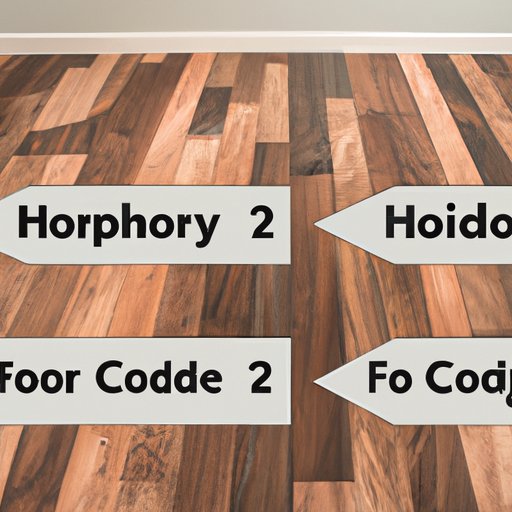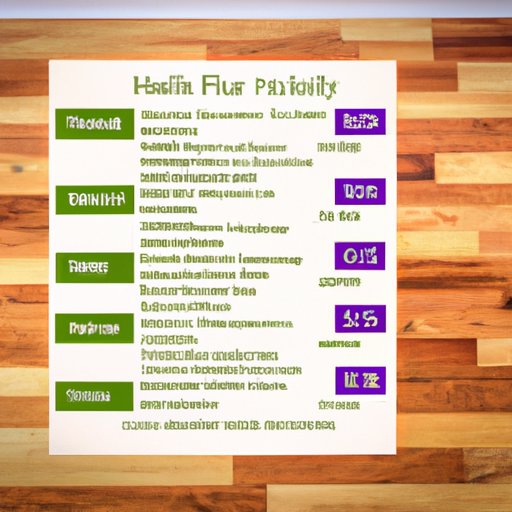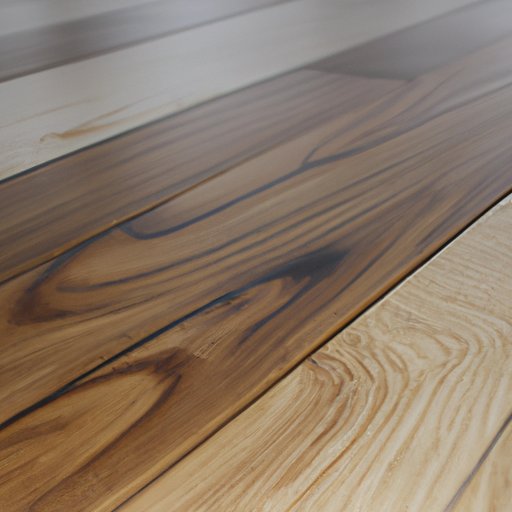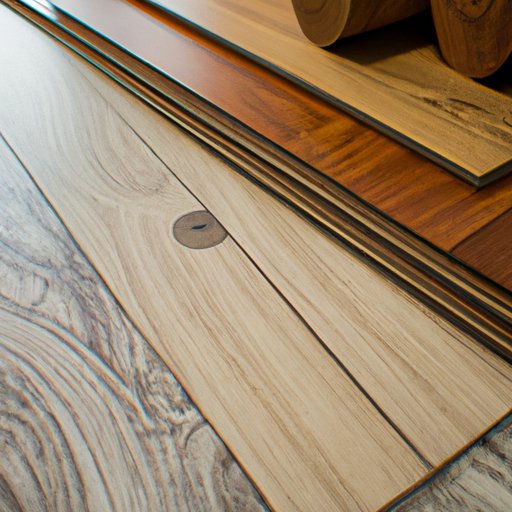Introduction
Hardwood flooring is a timeless addition to any home. It adds a classic elegance that can’t be replicated with other flooring materials. But before you commit to installing hardwood flooring in your home, it’s important to consider how much it will cost. In this article, we’ll explore the average cost of hardwood flooring compared to other types of flooring and provide an in-depth cost breakdown of installing hardwood floors.

Cost Comparison: Hardwood Flooring vs. Other Flooring Types
When it comes to comparing the cost of different flooring types, hardwood is often on the more expensive side. But depending on the type of flooring you choose, it may still be cheaper than some other options. Here’s a quick look at the average cost of some common flooring materials:
- Laminate Flooring: Laminate flooring is one of the most affordable flooring options, with prices ranging from $0.75 to $4 per square foot.
- Carpet Flooring: Carpet flooring costs an average of $2 to $7 per square foot.
- Tile Flooring: Tile flooring is typically more expensive than other flooring materials, with prices ranging from $3 to $20 per square foot.
- Vinyl Flooring: Vinyl flooring is on the lower end of the price range, costing an average of $2 to $5 per square foot.

A Comprehensive Guide to the Average Price of Hardwood Flooring
The cost of hardwood flooring can vary greatly depending on several factors, including the species of wood, the quality of the flooring, and the size of the area being covered. Here’s a comprehensive look at the average cost of hardwood flooring:
Factors Affecting the Cost of Hardwood Flooring
When shopping for hardwood flooring, you’ll find that there are many different varieties, each with its own unique set of characteristics and price tag. The following factors can affect the cost of hardwood flooring:
- Species: Different species of wood have different price points. For example, oak is one of the most common and affordable hardwood flooring materials, while exotic woods such as teak or mahogany tend to be more expensive.
- Quality: Hardwood flooring is available in a range of qualities, from budget-friendly entry-level options to higher-end products made with top-of-the-line materials. The higher the quality, the higher the price.
- Size: The size of the area being covered by the flooring will also affect the cost. Larger areas require more materials, which can drive up the price.
Average Prices for Different Types of Hardwood Flooring
The average cost of hardwood flooring varies depending on the type of wood you choose. Generally speaking, you can expect to pay between $3 and $12 per square foot for hardwood flooring. Here’s a look at the average cost for some popular hardwood flooring materials:
- Oak: Oak is one of the most popular and affordable hardwood flooring materials, with prices ranging from $3 to $8 per square foot.
- Maple: Maple is another popular choice, with prices ranging from $4 to $10 per square foot.
- Hickory: Hickory is a bit more expensive than other hardwood flooring materials, with prices ranging from $5 to $12 per square foot.
- Exotic Woods: Exotic woods such as teak or mahogany tend to be the most expensive hardwood flooring materials, with prices ranging from $7 to $15 per square foot.
The Pros and Cons of Hardwood Flooring and Its Price Tag
As with any home improvement project, it’s important to weigh the pros and cons of hardwood flooring before making a decision. Here’s a look at the benefits and drawbacks of installing hardwood floors in your home:
Benefits of Hardwood Flooring
Hardwood floors can add value to your home and last for decades if properly maintained. Additionally, hardwood flooring is easy to clean and offers a timeless look that can complement any decor. According to a recent survey of real estate agents, “90 percent of agents believe that homes with hardwood floors sell faster and for more money than those without.”1
Drawbacks of Hardwood Flooring
The biggest drawback of hardwood flooring is the cost. As we’ve discussed, hardwood flooring is generally more expensive than other types of flooring. Additionally, hardwood floors can be prone to scratching and denting, so they may not be the best option for homes with pets or children.
How to Choose the Right Hardwood Flooring Based on Your Budget
If you’re looking for a way to get the look of hardwood flooring without breaking the bank, there are a few things you can do to make sure you get the most bang for your buck. Here are some tips for choosing the right hardwood flooring based on your budget:
Consider Your Lifestyle
Before you start shopping for hardwood flooring, take a moment to consider your lifestyle. If you have pets or kids, you may want to opt for a more scratch-resistant species, such as hickory or maple. If you prefer a softer feel underfoot, you may want to consider engineered hardwood.
Select a Species
Once you’ve considered your lifestyle, you can start shopping for the right species of hardwood flooring. Oak is one of the most popular and affordable options, while exotic woods such as teak or mahogany tend to be more expensive.
Consider the Finish
The finish of your hardwood flooring will have an impact on the overall cost. Prefinished hardwood flooring tends to be more expensive than unfinished flooring, but it’s easier to install and requires less maintenance.
Measure Up
Once you’ve settled on a species and finish, it’s time to measure up. Make sure to accurately measure the area you’re covering and factor in any cuts or special shapes. This will help you determine how much material you need and avoid any costly surprises down the line.

What to Consider Before Purchasing Hardwood Flooring
In addition to the cost of the hardwood flooring itself, there are other factors to consider when calculating the total cost of your project. Here are some things to keep in mind before purchasing hardwood flooring:
Installation Method
Your installation method will have an impact on the cost of the project. Floors that are glued down or nailed down tend to be more expensive than those that are floated. Additionally, if you’re installing your hardwood flooring over an existing floor, you may need to budget for additional materials such as underlayment or adhesives.
Underlayment
For floating floors, you’ll need to factor in the cost of an underlayment. An underlayment helps insulate the floor and reduce noise, and it can range in price from $0.50 to $3 per square foot.
Maintenance
Finally, don’t forget to factor in the cost of ongoing maintenance. Hardwood floors need to be regularly cleaned and resealed to protect them from wear and tear. Depending on the size of your space, this could add up to a significant cost over time.
The Complete Cost Breakdown of Installing Hardwood Floors
Now that you’ve taken all the necessary factors into consideration, it’s time to calculate the total cost of installing hardwood flooring. Here’s a complete cost breakdown of what you can expect to pay for materials, labor, and installation:
Materials
The cost of hardwood flooring materials can range from $3 to $12 per square foot, depending on the species and quality of the wood. You may also need to factor in additional materials such as underlayment or adhesives.
Labor
Labor costs for hardwood floor installation can range from $2 to $5 per square foot, depending on the complexity of the job. Keep in mind that more complex jobs, such as those involving stairs or intricate designs, may cost more.
Installation
Installation costs will vary depending on the type of flooring you choose and the installation method. Glued-down and nailed-down installations are generally more expensive than floated floors, but they offer greater stability and durability.
Conclusion
Hardwood flooring is a great way to add value and beauty to your home. But before you commit to installing hardwood floors, it’s important to consider the cost. This comprehensive guide has explored the average cost of hardwood flooring compared to other flooring materials and provided a complete cost breakdown of what you can expect to pay for materials, labor, and installation. With a little research and planning, you can find the perfect hardwood flooring for your home and budget.
(Note: Is this article not meeting your expectations? Do you have knowledge or insights to share? Unlock new opportunities and expand your reach by joining our authors team. Click Registration to join us and share your expertise with our readers.)
